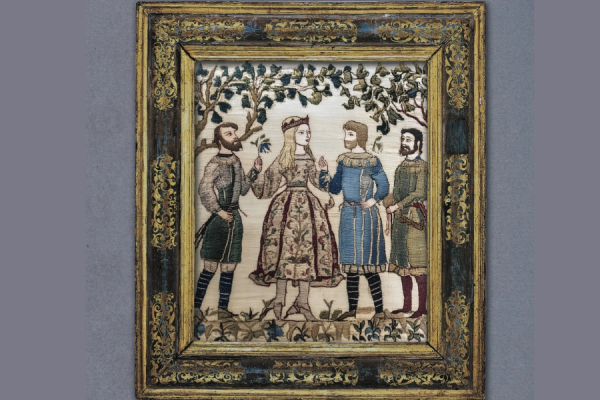
Three scholars will present talks on the unfairly neglected Elizabethan comedy Fair Em: The Miller’s Daughter of Manchester, an anonymously written play that at various points since the mid-seventeenth century has been attributed to Shakespeare. This event complements Lord Denney’s Players' production of the play, which will be performed at MadLab Theatre November 6-8.
The first edition of Fair Em, the Miller’s Daughter of Manchester is an undated quarto presumably printed by John Danter, whose printers’ device suggests a probable date of circa 1591–93 (STC 7675). The first edition was never entered into the Stationers’ Register and bears no authorial attribution.
Presentation Summaries
“Sometime attributed to William Shakespeare”: Fair Em and the Shadow of Shakespeare
Peter Kirwan, Mary Baldwin University
When Fair Em was revived at the Union Theatre in London in 2013, director/adaptor Phil Willmott unwittingly articulated the double-edged value of Fair Em being associated with Shakespeare. On the one hand, as he noted, audiences were probably only turning out to see this unknown play because of the Shakespearean attribution (with which Willmott had led advertising). On the other hand, the play itself (he felt, even as he tried to discuss its value) was “not even a match for Two Gentlemen of Verona”. This paper grapples with Fair Em’s Shakespearean baggage, from its initial lumping together with other plays operating in a popular vein, to its editing as an “apocryphal” play, to the anecdotal tradition of seeking out a “William the Conqueror” play yoking the “national poet” with the nation-creator of 1066. Theorizing whether and how it is possible to disentangle what a play is “on its own terms” from its reception history, this paper seeks to reappraise the terms on which we encounter Fair Em.
[Un]Fair Em[endation]: Perspectives from Editing the Play
Brett Greatley-Hirsch, University of Leeds
Who wrote the play and why should we care? Is the text an abridgement for performance, the product of memorial reconstruction, “as mangled a bad quarto as can be found”? Did a mysterious Third Quarto ever exist outside of the imagination of an eighteenth-century editor? Does one of the characters have a speech impediment or just a predilection for words beginning with “w”? Do we truly need another edition of this play, and how will mine offer anything different from what came before? These are some of the questions that have plagued my on-again, off-again editorial relationship with Fair Em, a late Elizabethan comedy of contested authorship that I am preparing for Digital Renaissance Editions. My paper will consider these and other challenges, both general and specific, associated with making an edition of a play that has received scant critical and theatrical attention speak to modern audiences.
Disability and Gender in Fair Em
Elizabeth Zeman Kolkovich, Ohio State
My talk examines Fair Em from the perspective of feminist disability studies, arguing that the play exposes both disability and gender as social constructs. A long history of critical disgust at the play’s “garbled” plot and “mangled” quarto draws attention to concerns about bodies evident within its content. The play’s emphasis on disguise and volatility blurs boundaries between able and impaired bodies, while characters like Em (who feigns sensory impairment as a logical extension of feminine virtue) and Blanch (whose unwomanly desire is pathologized as madness) serve to critique unrealistic expectations for women. Just as bibliographers’ desire for an ideal whole text left them routinely dissatisfied, the play teaches us that there is no such thing as a perfect or stable body. Rather than lamenting what the play lacks, I explore what we gain from the ways Fair Em forces us to reexamine long-held assumptions about bodies, identity, and narrative.
Speaker Bios
Peter Kirwan is Professor and Co-Director of the Shakespeare & Performance graduate program at Mary Baldwin University, in partnership with the American Shakespeare Center. He is the general editor of Shakespeare Bulletin, and has published widely on Shakespearean authorship and canonicity (including his first monograph, Shakespeare and the Idea of Apocrypha (Cambridge UP, 2015)) and the performance and textual afterlives of Shakespeare. He is currently working on a new edition of The Winter's Tale for the Arden Shakespeare.
Brett Greatley-Hirsch is a Professor of Renaissance Literature and Textual Studies at the University of Leeds. He is an editor of the journal Shakespeare, coordinating editor of Digital Renaissance Editions, a Trustee of the British Shakespeare Association, and a British Academy Mid-Career Fellow.
Elizabeth Zeman Kolkovich is an Associate Professor of English at Ohio State. She specializes in early modern English drama and poetry, with interests in gender, sexuality, and disability. She is the author of The Elizabethan Country House Entertainment and is finishing a book called Strange Spectacles: Performing Identity in Shakespeare’s Masques.
This event is free, open to the public and welcoming to everyone.
The Humanities Institute and its related centers host a wide range of events, from intense discussions of works in progress to cutting-edge presentations from world-known scholars, artists, activists and everything in between.
We value in-person engagement at our events as we strive to amplify the energy in the room. To submit an accommodation request, please send your request to Cody Childs, childs.97@osu.edu
